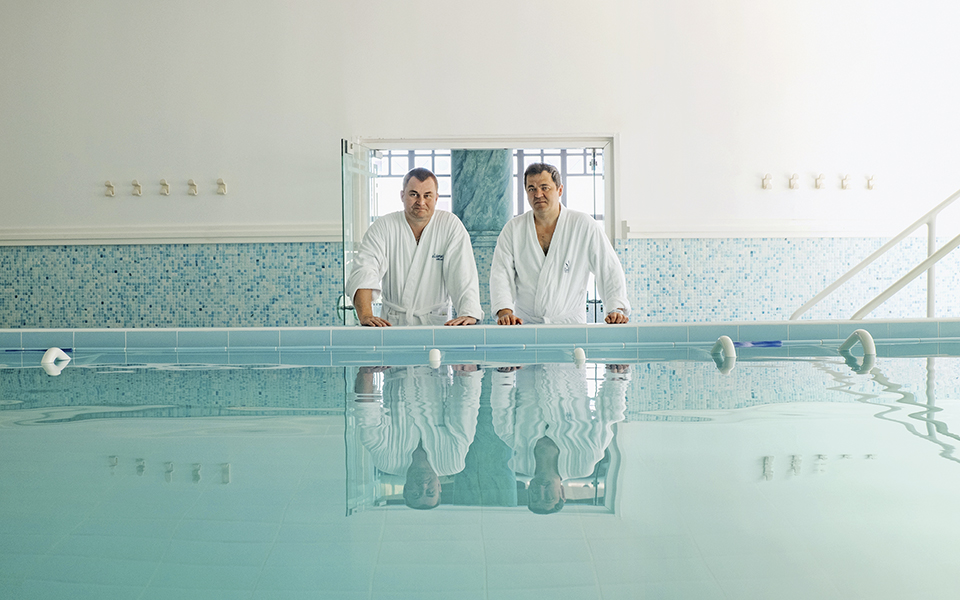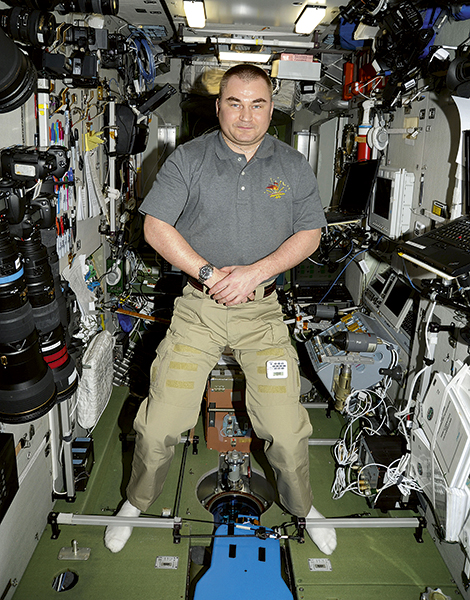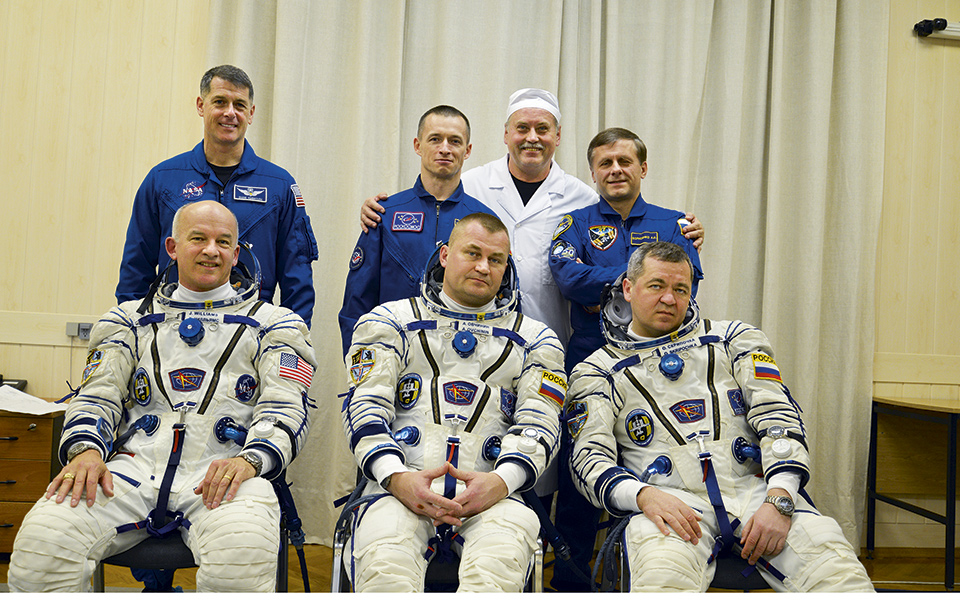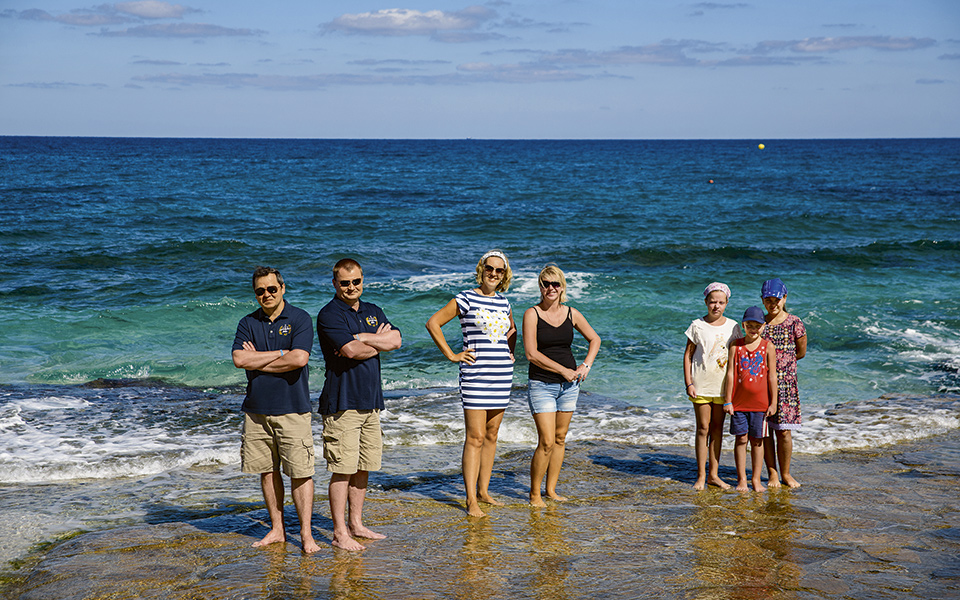It’s mid-October, a month and a half after their return to Earth, when I meet up with Russian cosmonauts Oleg Skripochka and Alexey Ovchinin as they reach the end of their rehabilitation program on the island of Crete. They are enjoying their breakfast in the sun-washed courtyard of the Aldemar Royal Mare Thalasso Resort in Hersonissos, along with their families, their coach Alexandr Serdyuk, from the Gagarin Research and Test Cosmonaut Training Center, and their Greek liaison, journalist Thanassis Avgerinos. Dressed in shorts and t-shirts, they seem to be in fine fettle, showing no sign of the ordeal they have been through prior to arriving here.
Our discussion begins with life in space. Ovchinin describes how, within 24 hours, you’ll see the sun rise or set 14 or 15 times and joked about how the Earth is actually perfectly round, while Skripochka speaks about how it feels to return. One of his most striking observations is how his sense of smell came rushing back; upon landing, his nose was filled with the natural aromas of flowers and grass. Beyond happy discoveries like this, however, the experience of “re-entry” is a tough one. “Life on Earth is no walk in the park when you’ve spent six months on the International Space Station,” says Skripochka. “From the moment you land, when you’re overcome by a sense of discomfort and overall weakness, to the first painful physical therapy sessions to work on lost muscle mass and to regulate your biorhythms again, it’s a lengthy process.”
To Earth-bound folk such as myself, the things Skripochka is describing seem incredible. To put it simply, once the cosmonauts boarded the spaceship to be shot up to the space station, they became superheroes who could fly, carry the weight of their 100kg suits and even lift an entire refrigerator with their little finger, thanks to the lack of gravity. When they returned to Earth six months later, they were “patients,” weak as kittens and in need of medical attention and a grueling rehabilitation regimen that would allow them to regain the basic functions needed to survive. It can take days to learn how to stand again after six months of floating; a lot of physical therapy is required to deal with the muscle pain, and it’s hard work to learn from scratch simple things, like doing the spatial math to walk through a door.

© Katerina Tsagaraki
“The effects on the organism are caused by the natural adjustment to the conditions of space flight,” explains Mikhail Potapov, Head of the Cosmonauts’ Rehabilitation Department at the State Institute of Medic0-Biological Problems of the Russian Academy of Sciences. “We have the effects of zero gravity, the strain of takeoff and leaving the Earth’s atmosphere – the sheer force of it – and then living in a restricted space, the effects of radiation and high-stress situations. The most typical “adaptation syndromes” are a “lazy” cardiovascular system, resulting in orthostatic intolerance and physical strain, loss of balance and effects on the autonomic nervous system, damage to the spinal column and to the systems regulating voluntary movement, metabolic pathways and, more than anything, the effects on the regulation of the water-salt metabolism.”
All of these rather ominous symptoms, however, disappear within six months of returning to Earth. The cosmonauts return to fighting form, primed for their next mission – on the condition that they follow an intense two-month rehabilitation program. The first phase takes place at the Yuri Gagarin Cosmonaut Training Center in Russia. It lasts two to three weeks and the emphasis is on regaining balance, improving the function of the spinal column and restoring blood flow and cardiovascular function. The second phase of rehabilitation is equally important. So that cosmonauts can return to regular life in Earth, it focuses on reuniting them with their families, honing social skills and overall rejuvenation. This part lasts 21 days and takes place at a resort with spa and physical therapy facilities.
“Sunny days, a temperate climate, the sea, physical therapy, the gym, the spa, the sauna and massages – we found everything we needed and a lot more we didn’t expect.” – Alexey Ovchinin

© Katerina Tsagaraki

© Katerina Tsagaraki
This is the third time that Russian cosmonauts are holding this part of their rehabilitation program in Crete. “Prior to this, the Russian space service would choose someplace like a resort in Karlovy Vary in the Czech Republic or a Russian hotels in Sochi or the Crimea,” says Avgerinos, who works at the Moscow-based public relations firm Agora and is one of the pioneers of the Crete rehabilitation program, which began in 2015. “The idea of coming here started with Dr Potapov expressing an interest in Greece. He got in touch with Greek-Russian cosmonaut Fyodor Yurchikhin; they contacted me, and we started working on the program.”
The selection of Crete was somewhat random to begin with. “It has plenty of tourism infrastructure and flexible businessmen who understood the concept immediately and embraced the program,” explains Avgerinos.
The medical report compiled by Cosmonauts Training Center after the first rehabilitation program showed impressive results. In his summary on cosmonaut Anton Shkaplerov’s progress, Potapov noted that, from the 15th to 17th day on the Greek island, all the cosmonaut’s basic function indexes had returned to pre-flight levels. In a self-assessment he gave upon completing the Crete program, Shkaplerov described his own physical condition as excellent. “The success rests with the fact that, contrary to the past, the program combined physical rehabilitation with a vacation and social activities,” Avgerinos points out. “The cosmonauts didn’t just come here to be isolated in some luxurious resort with all the necessary services and athletic activities, they got to enjoy the island as well.”
“Sunny days, the temperate climate, the sea, physical therapy, the gym, the spa, the sauna and massages – we found everything we needed and a lot more we didn’t expect,” says Ovchinin. “It was important to us that the trip was culturally interesting, that we had a lot of social interaction and that we met some very interesting people. What I will remember most is a visit to a school, where we got so much joy from the children and answered their questions. This made us feel that our work matters to regular people as well.”

© Katerina Tsagaraki
The aim now is to develop the program further and expand it to other parts of Greece. “We’ve got a lot of ideas and we’re designing a package that includes a stop in Athens, as well as visits to religious sites, which are really interesting to Russians,” says Avgerinos. “The important thing for us is that cosmonauts seem to be lining up to come to Greece. Both medical specialists and the cosmonauts themselves are so pleased with the rehabilitation that they have become ambassadors for the program. Some have even called us from the space station to discuss the Crete experience and the possibility of coming to Greece. That’s how it happened with Oleg and Alexey,” adds Avgerinos, looking at the Russian cosmonauts as they play with their children and splash around in the surf – just like regular tourists and not the awe-inspiring supermen they really are.











